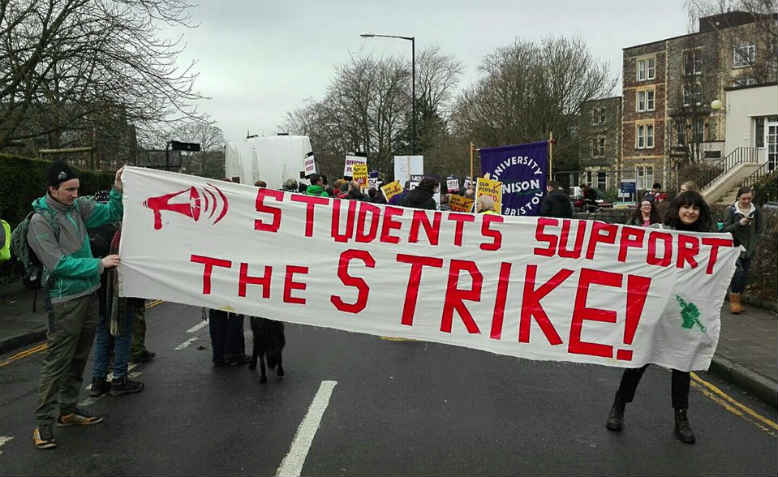 Students in Bristol protest in support of striking lecturers. Photo: Bristol Student-Staff Solidarity
Students in Bristol protest in support of striking lecturers. Photo: Bristol Student-Staff Solidarity
In solidarity with striking lecturers and opposing further marketisation of higher education, students begin occupying management offices reports Jack Sherwood
This dispute is linked to the Government’s plans to marketise education. Education should be a free public service. Instead, universities are being forced to act more and more like businesses. Private providers – who put profit before our education – are being given more and more of a role.
So reads part of the bold statement by occupying Bristol students.
The resolve of UCU, and wider staff and student solidarity hasn’t dampened any with the melted snow. In Bristol, many hundreds were out in pickets across the campus from 8am, congregating mid morning outside the management offices of senate house for a rally, before marching down to the iconic Wills Memorial Building. All this for the third time in such numbers in ten days, and with new faces showing up each time.

Meanwhile, Sheffield University saw lots out for a lively ‘disco’ picket line with flares, chanting and speeches, and Cardiff University students and staff successfully forced the Vice-Chancellor to attend a packed strike meeting this morning of over 150 people at a community centre for a Q&A over his failure to staff over pensions and veiled threats of having to take “drastic measures to get through this period.” A march and rally followed.
The main news today though is the occupations. In Bristol a lively bunch of students occupied management offices on the 5th floor and rooftop of Senate House, executing a highly visible banner drop – as documented in local news – providing energy for the congregation below during the rally.

In Leicester, Exeter and Bath uni students are also occupying management areas in solidarity with the strike, and in Sussex students have “blockaded management HQ”, shutting down the building.

The Exeter group say they are “advocating for a democratised education system where student and staff voices are empowered,” that “UUK [Universities UK – the university management consortium behind the pensions proposals] doesn’t represent the interests of university education and those who take part in it,” and “[t]he pension scheme changes we’re fighting against are yet another attempt to make academia more precarious.”

Bristol students have meanwhile submitted a list of demands (sent to us) to the university’s Vice Chancellor as follows:
a Address a rally (Wednesday) and speak to his striking staff and stand with them.
b Openly support his striking staff and take the position taken by the UCU and openly disclaim the projections (of deficit) for the USS scheme.
c Promise that staff taking Action Short of Strike Action won’t face a 25% cut to their normal pay.
d Raise employer contributions to maintain benefits at current levels and fight against redaction of university’s contribution to pensions.
e Promise redistribution of fees and salary, not paid to striking staff, for student hardship fund, wellbeing services and widening participation.
f Promise to combat the increasing casualisation of labour, poor treatment of staff, marketisation of education which is clearly impacting staff now due to pension cuts and has long been affecting students with the increase in tuition fees.
Further mass rallies at different universities are expected on Thursday for International Women’s Day, particularly over the large 12% Gender Pay Gap. In Bristol for instance, staff and students will be calling on the university to close it within three years.
The coming days look to be a very watchworthy trial of whether the movement around this strike can successfully broaden to embrace such other crucial concerns in higher education, and draw in stronger and greater participation of layers of staff and students not directly implicated in the pensions dispute. There is also much ground to cover in spreading in greater depth to university campuses across the country which are not currently rallying, and potentially joining up with thousands of UCU-affiiated striking staff in Further Education and their students who evidently have a strong interest in events in HE.
The more it can do all of this, whilst maintaining a firm stance concerning defending the USS scheme, one could argue the greater might be the chance of a victory for the UCU strike – a win that would have a chain reaction in campaigning over higher education.
Such a breadth of vision is encapsulated again in occupying Bristol students’ words:
We believe in a radical transformation of our education system. We support free, accessible education for both domestic and international students.
Our university should: cut the extortionate rent students face in halls, divest from fossil fuels, fund our mental health services adequately, and pay all university workers the living wage, with stable in-house contracts and a 5:1 pay ratio between the highest and lowest paid staff.
The Government should: scrap tuition fees altogether and guarantee all students a grant that is enough to live on; and end the Prevent programme and recognise our right to free speech and protest.
We need an end to the marketisation that has transformed universities into businesses and to bring about better conditions for staff on campus.
Solidarity with those on strike!




